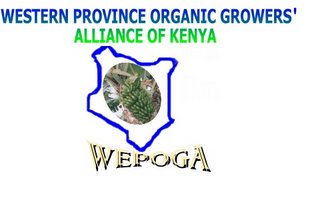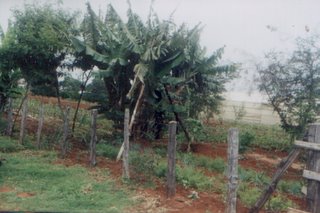


WESTERN PROVINCE ORGANIC GROWERS’ ALLIANCE (WEPOGA) OF KENYA
The Western Province Organic Growers’ Alliance (WEPOGA) of Kenya was founded by local, smallholder farmers in 2002.
MISSION STATEMENT WEPOGA is committed to building sustainable farming communities through organic agriculture.
WE ARE: an alliance of smallholder farmers with over 300 active members across 12 regional communities. WEPOGA is active the in villages surrounding Bungoma and its’ neighboring Districts.
OUR VISION is to empower smallholder farmers by reducing their dependence upon expensive artificial inputs, at the same time as raising their incomes by introducing them to alternative cash crops, markets and cooperative selling. By raising incomes through its capacity building programs, WEPOGA will help farming communities to reinvest in their social and economic development.
OUR STRATEGY is to reduce the incidence of poverty among smallholder farmers in the Western Province by:
· Reducing their dependence upon expensive, artificial inputs such as chemical fertilizers and pesticides by introducing them to organic farming techniques such as composting, intercropping, crop rotation, double digging, integrated pest management and creating organic pesticides.
· Diversifying their production of cash crops with a greater earning potential than maize and sugar cane.
· Increasing their food security by encouraging them to establish kitchen gardens to supplement their family’s meals.
· Increasing their incomes by assisting farmers to gain access to the price premiums available for organic produce in other regions of Kenya and overseas.
· Establishing cooperative planting and harvesting agreements amongst WEPOGA members, so as to maintain a constant supply and therefore price for their produce.
· Expanding the market for organic produce in the Western Province of Kenya by networking with the major purchasers of agricultural products in the region, and by distributing promotional major purchasers of agricultural products in the region, and by distributing promotional material outlining the health benefits of eating organic food. ·Reducing the health risks caused by the environmental pollution that results from the over use chemical fertilizers and pesticides. .Sponsoring farmers to attend training courses at registered educational institutions so that they can further their knowledge and expertise of modern production techniques, marketing strategies and other important business skills. ·Encouraging farmers to reinvest the dividend they’ve gained from organic farming in their children’s higher education, and therefore in the future social and economic development of their local community and Western Province.
WHY ORGANIC PRODUCTION IS BETTER FOR WESTERN PROVINCE FARMERS
- Artificial methods are expensive. Pesticides and fertilizers cost farmers more than 3500 shillings per year. At the same time, reduced soil fertility as a result of the overuse of fertilizers and monocropping has delivered farmers steadily declining yields, and shrinking incomes. The only solution is to switch to organic farming. Not only are natural methods much cheaper, they are more effective than artificial chemicals at returning nutrients to the soil.Organic farming involves utilising materials that are readily found around the home and farm: egg shells, animal droppings, local plants, and kitchen wastes.
2. Pesticides and fertilizers are dangerous for our health. Spraying chemicals on crops means that they remain on the food we eat, get carried on the air we breathe, and seep into the water we drink. They can cause miscarriages for pregnant women, brain damage in children, and even sickness in adults. Organic farming, through the production of food free from contamination by harmful chemicals, can greatly help reduce these health problems in the Western Province.
3. Artificial chemicals are harmful to the environment. Non-organic chemicals have a negative impact upon plant and animal life, in addition to bleaching farmers’ soils of nutrients.
4. The market for organic products is growing worldwide. Not only is demand increasing for organic fruits and vegetables overseas, but here in Kenya. While organic farming is relatively new to Western Kenya, organic production has been thriving in Central and Eastern Kenya for almost 20 years. As a result, the potential for ongoing income growth for organic farmers in the Western Province is almost limitless.
WHY FARMERS IN WESTERN PROVINCE NEED TO DIVERSIFY THEIR PRODUCTION:-
80 per cent of families in rural Kenya depend upon farming for their welfare. The average farm size is less than three acres. An overwhelming proportion of farmers in Western Province grow sugar cane as their only cash crop. As a result, there is a serious over supply of this product, driving down prices and family incomes. In recent years production has been falling, including a 9 per cent reduction in 2004, despite a marginal increase in the area committed to sugar cane (2 per cent extra in 2004). This decline illustrates the impact of increasingly poor soils on farm production in Western Province. The extensive use of chemical fertilizers over the last three decades to increase productivity per acre in Western Province has helped to denude much of the soil of nutrients, contributing to declining yields. Sugarcane takes two years to mature and generally it yields a maximum of 50000 KSh per acre, the equivalent of $658 US, or $329 per year. In 2003, a new cane pricing procedure reduced the price paid to farmers from 2,015 Kenyan Shillings per ton to just 1,800 – a drop of almost ten per cent. In addition, the Kenyan Government has recently introduced A 7 per cent tax excise on all farmers producing sugar cane. As a result, sugar cane has become increasingly uneconomical for small farmers in the Western Province, and an over reliance on it has contributed to a declining standard of living among the families in farming communities in Western Province. Subsequently, the average per capita income in Western Province is the lowest of all Kenya’s provinces at just 11,191 Kenyan Shillings per year. In comparison, the average annual income in Nairobi is some 78,644 Kenyan Shillings per year.The only solution to this confluence of economic and environmental decline is to assist local farmers to diversify by switching to the organic production of a new set of cash crops. WEPOGA is slowly empowering local farmers with the knowledge that there are alternatives to selling sugar cane, including products such as hot peppers, sweet potatoes, Soya beans and sunflowers. Hot peppers, for example, can be harvested after only 3 months. The Horticultural Development Programme (HDP) of USAID has been working in Kenya for the past year to assist farmers in finding export markets, and currently guarantees 150 Kshs per kilogram of certified organic hot peppers for sale in Germany, Holland and Japan. Over the same period, therefore, a farmer producing an average of 300-400 kilograms of hot peppers per year on a three-acre plot can double his income, relative to that earned from sugar cane, to around 90,000-120,000 Kenyan shillings. WEPOGA also educates its members and farmers participating in workshops, about the importance of including a kitchen garden on their land. Food security and improved nutrition among the local population is an important goal of the organization. Crops such as cassava, millet, sukumawiki and black nightshade, beans and tomatoes provide a rich supplement to the diets of farming families.
ORGANIC FARMING IS SIMPLY NATURAL
Through its organic farming workshops and field schools, WEPOGA demonstrates the basic principles and techniques of natural farming. Organic fertilizer can be produced from composting a mixture of farm and household wastes: kitchen wastes, dry leaves, grass, maize stalks, soil, eggshells, animal droppings and kitchen ash.Organic pesticides are similarly made from items easily found around or on the farm: Sodom apples, bitter mung'ulie leaves, red onions, kitchen ash and hot peppers. Techniques such as intercropping
—planting local plants such as the gravilia trees mixed in with your crops
—can return nitrogen to the soil, while feeding your livestock as well. In addition, by alternating the crops grown on a given plot, soil can be made more productive and fertile without the use of chemicals.In addition, by alternating the crops grown on a given plot
– crop rotation
- the diversity of plant matter can return nutrients to the soil, increasing its productivity.Integrated Pest Management is another important strategy for improving crop yield without relying upon artificial farm inputs. Introducing natural predators such as praying mantises and ladybugs can help control pests, while birds and insects can are diverted by planting Desmodium seeds
– a locally found resource
– in a neighboring area. Desmodium seed are also useful for controlling striga weed and for returning nitrogen to soil. Paper bag scarecrows are also useful for scaring away potentially destructive birds: paper bags tied to trees or posts move when blown by the wind, creating the illusion that someone is guarding the fields.By double digging soil beds
– removing and rotating two feet of soil, thereby breaking the clay pan and enabling crop roots to reach greater depths and more nutrients
– farmers can improve their soil productivity and allow closer spacing of vegetables.By teaching farmers the techniques utilized successfully by so many previous generations and demonstrating some new ones, WEPOGA works to empower smallholder farmers from the Western Province of Kenya to improve the sustainability of their farms, their families and their communities.
WORKING WITH WEPOGA
WEPOGA travels across Western Province conducting farmer workshops and field schools to educate interested communities about organic farming techniques. We also provide marketing support for producers of organic cash crops, and assist with the supply of organic inputs and information. Farmers who have participated in WEPOGA’s field schools and work shops are then encouraged to join with their others from their local communities in organic farming cooperatives. By farming cooperatively, inputs like animal manure for fertilizer and hot peppers for pesticides can be shared among the community. Farmers are then invited to request follow up visits to their farms by WEPOGA’s educators for an additional consultation. WEPOGA is also actively networking with organisations marketing and purchasing organic produce in Western Kenya and overseas, in an effort to increase farmer incomes. Members of WEPOGA meet once every month to share information about organic farming, and to cooperatively plan their planting and harvesting seasons so as to reduce competition.
THE WEPOGA COMMUNITY
WEPOGA is looking for partners to help expand its education and marketing operations through the establishment of a permanent demonstration plot and learning centre, office and storage facilities.
